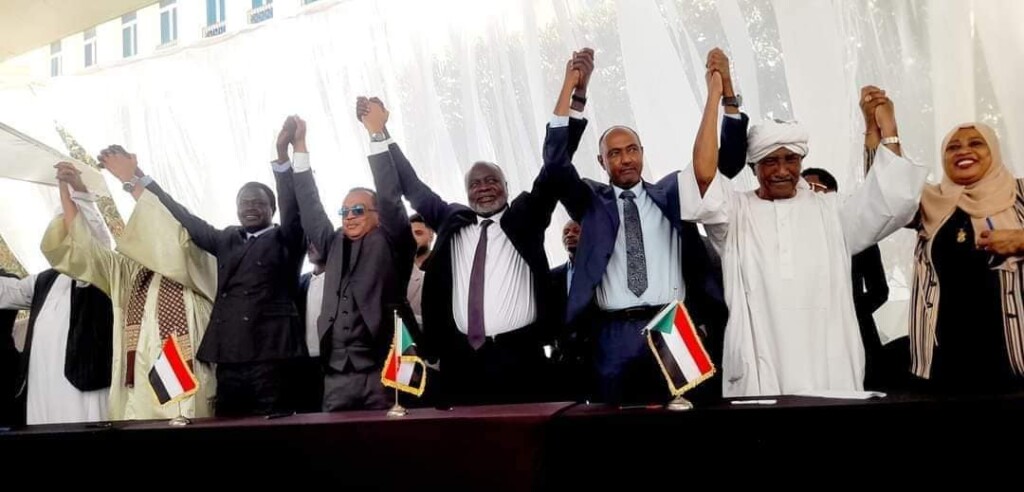Sudan political blocs’ charter shapes post-war transition

Sudanese political leaders celebrate after signing the charter in Cairo, the capital of Egypt, on May 8 (Source: Sudanese Alliance Forces via FB)
A group of 48 Sudanese political and civil blocs signed a charter in the Egyptian capital, Cairo, on Wednesday, outlining their vision to manage the transitional period after the war. The signatories, who back the Sudanese Armed Forces (SAF), aim to determine the future of governance in Sudan through an inter-Sudanese dialogue.
The charter, titled The Understanding Framework Vision for Managing the Transitional Founding Period, was drafted during a conference organised by the Forces for Freedom and Change-Democratic Bloc (FFC-DB)* in Cairo, Egypt. Signatories include the FFC-DB, the Popular Congress Party (PCP), Reform Now, and the split-off faction of the National Umma Party (NUP) led by Mubarak El Fadil, among others.
The charter outlines tasks for the transitional period, including post-war reconstruction, economic recovery, permanent constitution drafting, Juba Peace Agreement implementation, peace negotiations with non-signatory factions, addressing the eastern Sudan issue, revising nationality laws, and regulating foreign presence.
The final document advocates for an inclusive inter-Sudanese dialogue “without exclusion” and urges regional and international bodies to maintain impartiality in resolving the crisis.
According to Noureldayem Taha, a leader in the Sudan Liberation Movement faction led by Minni Minawi (SLM-MM), which is co-founder of the FFC-DB, the signatories represent various Sudanese intellectual and political groups “from all parts of Sudan”.
Resuming negotiations through the Jeddah Platform to facilitate humanitarian aid access is strongly emphasised in the document, along with upholding existing agreements involving international participation.
The signatories expressed support for the Sudanese Armed Forces (SAF) as the country’s “sole legitimate institution responsible for security and defence” during the ongoing conflict. It also calls for reforms within state agencies to ensure national unity, independence, and equal opportunities.
Taha pointed out that the conference “did not address the participation of the National Congress Party (NCP) in the dialogue”, the now-defunct former ruling party of Omar Al Bashir.
The SLM-MM leader strongly refuted allegations made by Sayed Abu Amna, political secretary of the Adarob wing of the High Council of Beja Nazirs and Independent Chieftains, in which he accused signatories of supporting the former regime and perpetuating conflict. “The armed movements have historically resisted against the previous regime” Taha told Dabanga.
Structurally, the proposed transitional period comprises a Sovereignty Council with civilian and military representatives, a ministerial council, and a legislative assembly. A committee from the Inter-Sudanese Dialogue Conference will nominate three candidates for the position of prime minister, with the Sovereignty Council making the final selection. The legislative council is planned to consist of 300 members, with the duration of the transitional phase to be determined by the Inter-Sudanese Dialogue.
* The FFC-DB was formed in November 2022. It brings together two Darfur rebel movements that backed the SAF-RSF coup d’etat in October 2021 (the Justice and Equality Movement (JEM) led by Jibril Ibrahim, and the Sudan Liberation Movement (SLM-MM) split-off faction headed by Minni Minawi), along with the Democratic Justice Alliance chaired by former rebel leader Mubarak Ardol, and the mainstream Democratic Unionist Party. The alliance also includes the Republican Party, the Beja Nazirs Council wing chaired by Sayed Tirik, the National Movement Forces coalition of former Darfur leader El Tijani Sese, and a number of split-off groups from mainstream political parties.











 and then
and then